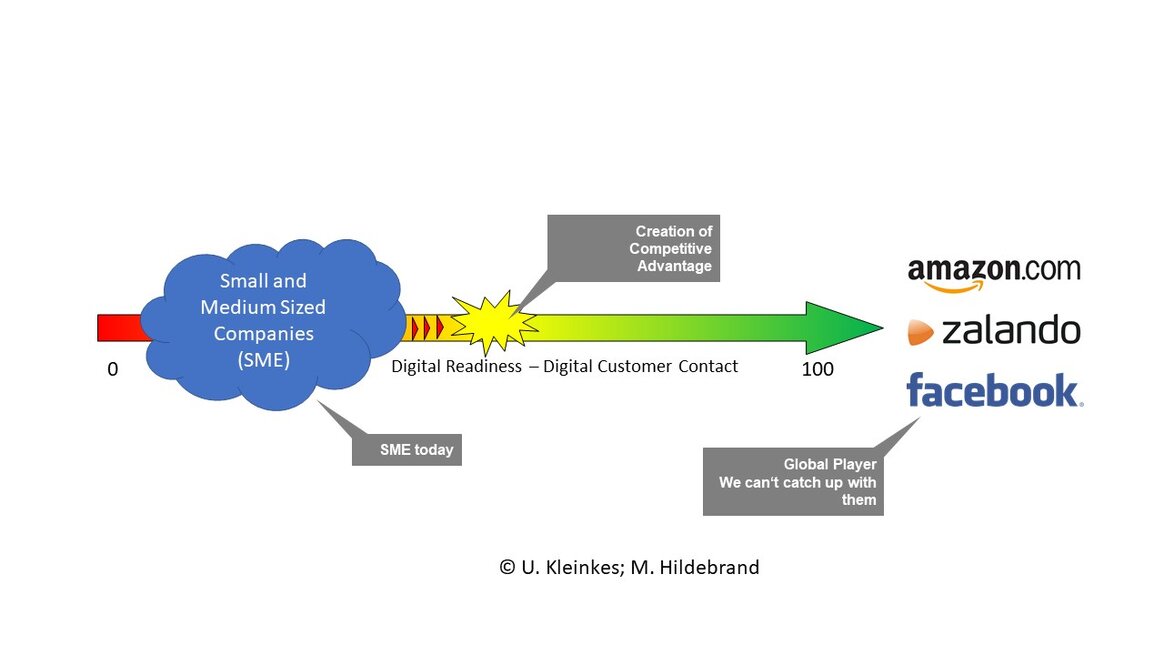

 Favorite (12)
Favorite (12)
While in the days before Corona people in Germany for example were still angry about the obligation for companies to issue a receipt and considered cashless payment to be a Chinese whim, many companies have now had to find out painfully: there is a lack of digital competence.
After Corona, there will hardly be any companies left without digital services. Nevertheless, it will not be easy: there is a lack of resources, skills and affordable IT offers, especially in medium-sized companies.
One of the main problems is that many software manufacturers in the marketing sector are strongly oriented towards large companies. Solutions, e.g. in the area of marketing automation, Customer Relation Management and the like are often hardly affordable for small and medium-sized companies.
When it comes to competencies, networks, business development agencies and chambers of commerce are increasingly in demand to shorten learning curves. A good consulting, training and exchange network helps to act more efficiently. If you don't have to try out 12 CRM tools yourself, you can save money by shortening learning curves. SMEs in particular would like advice on this point. This is also confirmed by a study by the HSHL (German).
Everyone should have heard the "Corona wake-up call". While you might still have been able to afford to act on a low level so far - also because the competition may have been asleep - a lot more companies are now likely to get going. Corona will change (digital) marketing for SMEs!
This may mean for yourself that all efforts have to be increased again. Speaking metaphorically: as an SME you can create a sustainable competitive advantage by being ahead of your competitors in digitalization. The big blue cloud will move to the right. If you want to be the yellow flash you should move!

The corona crisis leads to people working in the home office. If you didn't have a professional technical infrastructure before Corona, you have to implement it now. Because one thing is already clear: After Corona, this will be the standard! There will probably be fewer business trips and more teleconferences in the long term.
The reasons for this are:
"Telco professionals" are then expected from the customer. While in the past you might have had patience and understanding with technical jitter and poor sound quality, customers will expect something professionally organized after Corona at the latest.
How to do it well is written here.
Through a digital conference situation, many areas of human communication are strongly "filtered" by technology. Many of the advantages of personal conversation no longer exist in this way. It becomes increasingly difficult...
You should prepare yourself internally for these changes. For senior salespeople who have been able to work wonders in personal dealings - e.g. with the bouquet in the anteroom - it is not always easy.
The personal meeting of customers is very important, especially for medium-sized companies. If you don't offer anything off the shelf, you have to explain your advantages and build trust through your personality. For large companies, the charisma of the big brand helps. Here the saying "Nobody has been fired buying IBM" applies.
The little sister of the company visit is the telephone call or the video conference. All digital measures should lead to this goal: to talk to customers at least in this way. The personal meeting - for example in your own company - remains the ultimate goal, of course.
Prof. Kleinkes gave a lecture on this topic, among others, in the Focus Group Marketing: Within that group IVAM members discuss and develop marketing measures for SMEs and effective campaigns with small resources. Together, strategies and concepts are developed to understand problems and needs of customers in the fields of microsystems technology, nanotechnology, MEMS, new materials, micro-optics or photonics, sensor and measurement technology, organic or printed electronics. The main aspect is the industry-specific exchange of experience, target group-relevant information and exclusive networking. The topics are geared to the needs and resources of small and medium-sized enterprises.